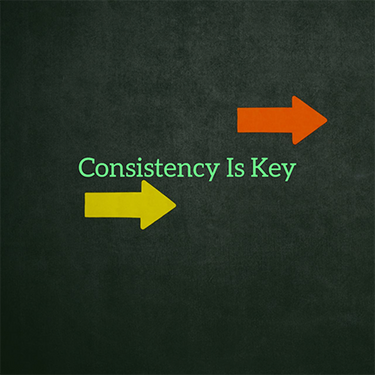
Consistency, that virtue that drives us to persist in our goals despite obstacles, is a fundamental pillar for achieving success in any area of life. In this article, we’ll explore how consistency intertwines with perseverance, happiness, and personal development, and how we can cultivate this valuable quality in our daily lives.
Consistency is the foundation on which perseverance is built. By maintaining continuous and sustained effort over time, we develop habits that bring us closer to our goals almost automatically.
As Charles Duhigg mentions in his book The Power of Habit, habits are structured in a cycle of three stages: cue, routine, and reward. To cultivate consistency, it’s essential to understand this cycle and use it to our advantage.
Cue: Identifying the triggers that prompt our habits is the first step. These can be places, people, times, or even emotions. For instance, the sofa might be a trigger to watch TV instead of reading a book.
Routine: The routine is the action we perform in response to the cue. It’s important to replace unhealthy routines with more productive ones.
Reward: The reward reinforces the habit. It can be a feeling of pleasure, relief, or any other form of gratification.
Set SMART Goals: SMART goals are specific, measurable, achievable, relevant, and time-bound. By setting clear and realistic goals, it’s easier to stay motivated and measure progress.
Create a Supportive Environment: Modify your environment to facilitate the adoption of new habits. For example, if you want to read more, place a book in a visible spot.
Celebrate Small Wins: Recognising our achievements, no matter how small, helps maintain motivation and builds our confidence.
Be Patient and Kind with Yourself: Changing habits requires time and effort. It’s essential to be patient and forgiving with ourselves when we make mistakes.
The “daily small step” technique consists of breaking down a large goal into small actions that we can take each day. This strategy reduces feelings of overwhelm and makes change more manageable.
Stepping Out of the Comfort Zone: Stepping out of our comfort zone is essential for growth and development. However, it’s important to do so gradually. Start with small challenges and progressively increase the difficulty.
The Importance of Intrinsic Motivation: Intrinsic motivation, that which comes from our own interest and satisfaction, is far more powerful than extrinsic motivation, which is based on external rewards. By connecting our actions with our values and passions, we’re more likely to sustain consistency over the long term.
Visualisation and Positive Affirmations: Visualisation and positive affirmations are powerful tools to strengthen our determination and foster consistency.
Visualisation: By creating vivid mental images of ourselves achieving our goals, we activate the same areas of the brain as if we were experiencing the situation in real life. This boosts our motivation and helps us stay focused.
Positive Affirmations: Regularly repeating affirmative phrases can reprogramme our minds and change the way we think. By affirming that we’re capable of achieving our goals, we strengthen our self-belief.
Our social environment has a significant impact on our habits and behaviours. Having the support of friends, family, or support groups can be a great motivation to maintain consistency.
Support Groups : Joining groups of people with similar goals can provide a sense of belonging and accountability.
Having a Training Partner: Sharing the journey with someone can make the process more enjoyable and challenging.
Celebrating Achievements Together : Sharing our successes with others reinforces our motivation and makes us feel part of something bigger.
Mindfulness and meditation are practices that help us stay present in the moment and develop greater awareness of our thoughts and emotions. By practising mindfulness, we can:
Improve Our Attention: Enhance our ability to focus on a task and resist distractions.
Reduce Stress: Lower cortisol levels, the stress hormone, which promotes relaxation and wellbeing.
Increase Self-Awareness: Better understand our thoughts and emotions, enabling us to make more conscious decisions.
Develop Self-Discipline: Train our minds to resist impulses and stay focused on our goals.
Conscious Breathing: Focus on our breathing for a few minutes each day.
Guided Meditation: Use apps or videos to practise guided meditations.
Mindfulness in Daily Life: Practise mindfulness during everyday activities like walking, eating, or showering.
Good time management is essential for maintaining consistency in our goals. By organising our time effectively, we can dedicate quality time to activities that bring us closer to our objectives and avoid procrastination.
Pomodoro Technique: Work in 25-minute intervals, followed by a 5-minute break. After four cycles, take a longer break. This technique helps maintain concentration and avoid mental fatigue.
Eisenhower Matrix: This matrix categorises tasks into four quadrants (important and urgent; important but not urgent; urgent but not important; neither urgent nor important) to help us prioritise what truly matters.
Kanban: This visual technique allows us to view our work in progress and plan future tasks.
ABCDE Method: Each task is categorised with a letter, from A (very important) to E (not important), helping us to focus on the most relevant tasks.
Set Clear and Realistic Goals: Define your short- and long-term objectives.
Create a Schedule: Dedicate time each day to plan your activities.
Eliminate Distractions: Find a quiet space to work and avoid interruptions.
Delegate Tasks: Don’t hesitate to ask for help when needed.
Learn to Say No: Avoid overloading yourself with work.
While time management techniques are useful, it’s important to remember that life is dynamic and unexpected events can arise. Be flexible and adapt your planning to changing circumstances.
Consistency is a virtue we can cultivate through practice and discipline. By combining healthy habits, visualisation, positive affirmations, social support, and mindfulness practices, we can develop the determination needed to overcome any obstacle and reach our goals. Remember, success is not a destination but a journey.
Enjoy the process and never give up.
Thanks for reading me,
Jhamile Abuabara
